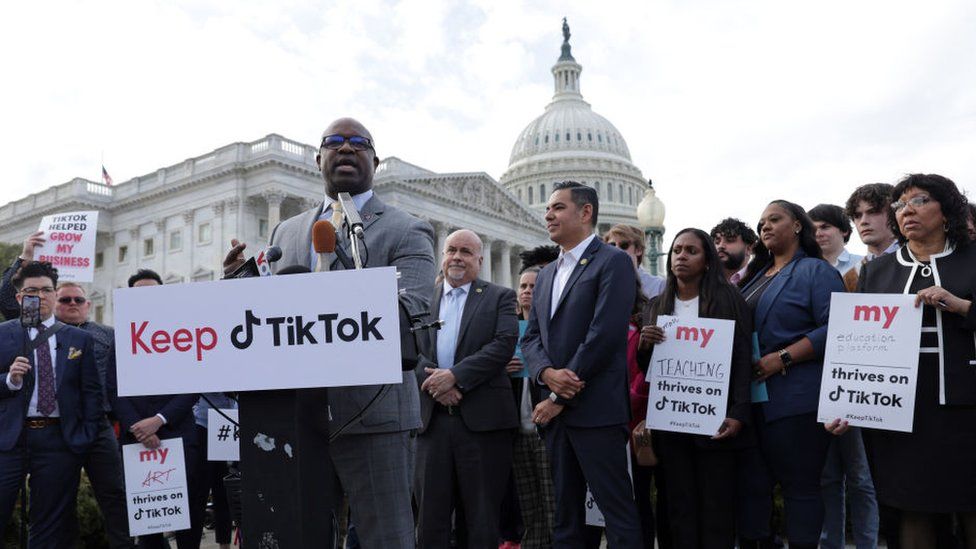
TikTok has few supporters on Capitol Hill – and may have lost some this week
By Sam Cabral
BBC News, Washington
US congressional offices have told the BBC they are being deluged with calls from TikTok users about legislation that could see the popular app banned.
Callers range from teenagers to the elderly, and most are “really confused and are calling because ‘TikTok told me to'”, one Republican staffer revealed.
A Democratic staffer said the most aggressive and threatening calls their office received came from adult women.
So far, TikTok’s big mobilization appears to be backfiring.
Lawmakers and their staff say that the lobbying campaign has actually worsened the concerns they have about the app and its parent company ByteDance, and strengthened their resolve to pass the legislation.
The bill, introduced by a bipartisan group of 20 lawmakers, would mandate that ByteDance sell TikTok within six months, or TikTok would be removed from mobile app stores in the US.
The legislation is sailing through Congress, winning rare unanimous approval from a key committee, and the full House is expected to vote on it on Wednesday. President Joe Biden has said that he will sign it into law if it reaches his desk.
Its swift advance has drawn a frantic last-minute push by TikTok to mobilise users directly against those responsible for the legislation.
TikTok confirmed to the BBC it had sent a notification urging TikTokers to “call your representative now” to urge them to vote against the measure. Users said that the app gave them a direct link for calling the representatives for their districts.
Florida Congressman Neal Dunn’s office told the BBC it has received more than 900 calls from TikTokers, “many of which were vulnerable school-aged children” and some of whose extreme rhetoric had to be flagged for security reasons.
Mr Dunn, a Republican, is an original co-sponsor of the bill.
“This effort by ByteDance validated the Congressman’s concerns,” his office said in a statement.
“American phones were geolocated and TikTok users were locked out of the platform until they called their members of Congress. ByteDance weaponized the app against America, and that is exactly why the Congressman supports this measure.”
When contacted about those allegations by the BBC, TikTok provided the statement: “With regards to users being locked out of the app until they called, that is false. All users had two methods for dismissing the notifications.”
Lawmakers have long accused ByteDance of having links to the Chinese Communist Party (CCP) and have cast the video-sharing app as a potential threat to Americans’ privacy and mental health. TikTok, which says it is now used by more than 170 million people in the US, and ByteDance deny those claims.
Carlos Gimenez, who sits alongside Mr Dunn on the House committee behind the bill, said he would not be deterred from voting for it “regardless of TikTok’s targeted campaign against members of Congress”.
A spokesperson for New York Democrat Ritchie Torres – a joint leader of the legislation – confirmed that his office too has received “seemingly endless calls” though none were of a threatening nature.
“I am deeply troubled by reports of young people calling Congress, threatening to commit suicide or otherwise harm themselves,” Mr Torres said in a statement to the BBC.
“The iron grip that TikTok has on the minds of young people is a profound public health hazard.”
TikTok boss grilled on CCP ties: ‘I am Singaporean’
Staffers to other lawmakers on both sides of the aisle also reported hundreds of calls to their offices, from app users young and old, who did not have a clear idea of either who or why they were calling.
A spokesperson for Dusty Johnson told the BBC his office had received calls from people who were very upset, as well as “some people who are asking kindly if TikTok is going to be banned, and some have said TikTok wouldn’t let them on the app without calling their [representative]”.
The callers had been of all ages, the spokesperson added.
Mr Johnson, a South Dakota Republican, has been outspoken about the national security threat posed by TikTok and is supportive of the proposed bill.
11 March 2024 – This story was updated to clarify comments made by a spokesperson for Dusty Johnson.








